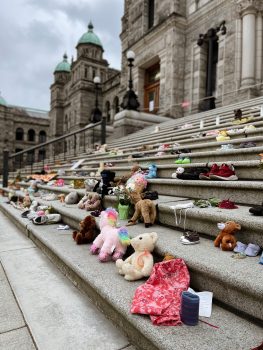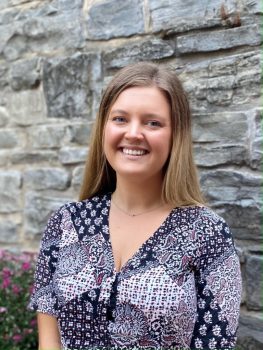Amidst the recent news of the discovery of mass and unmarked graves at multiple residential schools, you may be feeling wary about participating in your usual Canada Day celebrations. You are not alone. Many Canadians grew up feeling a strong connection to Canada; spending summers in the woods and winters watching hockey. Maple syrup, Tim Hortons, and late-night poutine may feel like home to hundreds of thousands of people. This version of Canada is one that is easy to love, but it is disingenuous.

“For the children who never came home” Photo by Sonya Romanovska on Unsplash
In reality, Canada is a colonialist nation built on a blatant disregard for the people who were here first. Indigenous people have been violently and purposely erased for hundreds of years. “The Great Dying” is estimated as the second-largest mortality event in human history, behind only World War II; when European settlers arrived, they wiped out 90% of the estimated 60 million Indigenous people in the Americas, through disease, violence, and discrimination.
Recent discoveries of large, unmarked graves, containing the remains of hundreds of children, on the sites of residential schools emphasize these atrocities even further. The last residential school did not close until 1996; this history is tragic and it is recent. Systemic injustice continues today; Indigenous people are overrepresented in the criminal justice system, welfare system, and foster care system. Many Indigenous communities do not have access to clean water, mental health resources, proper healthcare, and much more. There is so much that needs to happen before we should feel proud to be Canadian.
Reflect on some of the things you love about Canada.
Do you love the beautiful and diverse landscapes, and feel at home on a lake? Indigenous culture is deeply entwined with protecting the land and lakes, and colonialist-settler culture not so at all.
Are you still spending your Saturday nights watching Hockey Night in Canada, and do you get excited to cheer on Sidney Crosby, Marie-Philip Poulin, and the rest of Team Canada at the Olympics? It turns out hockey’s roots are from Mi’kmaw culture.
Do your summer playlists consist of The Tragically Hip and other Canadian artists? Gord Downie spent his life and last years fighting for Indigenous rights and educating people on Canada’s dark history.
Many of the things we love about Canada do not exist BECAUSE of Canada but in fact IN SPITE of Canada.
Speaking as a descendant of colonizers, we have lots to do and lots to learn. We must work toward decolonization and reconciliation. And what is decolonization? Nikki Sanchez explains in her talk at TEDxSFU.
Canada Day celebrates the day that Canada officially became a sovereign nation; this is problematic as it ignores the hundreds of nations that existed on this land beforehand. As long as Canada Day still exists, use it to educate yourself and reflect, and to support Indigenous people in your community. Talk to your loved ones about colonialism. If you are having trouble starting those conversations, read this helpful post.
Here are 10 things you can do on Canada Day, and moving forward, to learn about Canada’s colonialist history, to support Indigenous people, and to work toward reconciliation.
1. Learn about the history of colonialism in Canada:
Whether this is new to you, or you have been reading about it for years, there is always more to learn about the impacts of colonization in Canada. Read about residential schools, the sixties scoop, Starlight tours, and Missing and Murdered Indigenous Women and Girls.
2. Read the Truth and Reconciliation reports:
The Truth and Reconciliation Commission of Canada (TRC) created 94 Calls to Action, aimed at urging governments to act to repair harm inflicted by residential schools and to enable healing.
3. Support local Indigenous-owned businesses:
If you are in Vancouver, pick up some coffee from Spirit Bear Coffee Company, head to Mr. Bannock Indigenous Cuisine in North Vancouver for lunch, or order wellness products including bath bombs, soaps, and salves from Sisters Sage.
4. Learn about the land you are on:
If you are reading this in Canada, you are likely on the traditional territory of a First Nations, Metis, or Inuit group. Visit native-land.ca, or download the app, to learn more about the territory, language, and treaties relevant to where you live.
Once you have learned this, spend Canada Day exploring the land nearby and connecting with nature through participating in an Indigenous-led outdoor experience
5. Subscribe to Indigenous news sources:
If you prefer a newspaper format, try Windspeaker, if you prefer Instagram and are interested in helping uphold Wet’suwet’en law in protecting land/water/people, follow @wetsuweten_checkpoint, or if you prefer Twitter, follow @CBCIndigenous.
6. Read Indigenous authors and works:
Looking to add to your summer reading list? Try Indian Horse by Richard Wagamase, The Marrow Thieves by Cherie Dimaline, or All of Our Relations: Finding the Path Forward by Tanya Talaga. A longer list of book recommendations can be found on GoodReads. Purchase these books and more at 100% Indigenous-owned Massy Books in Vancouver.
7. Listen to Indigenous musicians
There is Indigenous music for everyone. William Prince, The Halluci Nation, andBuffy Sainte-Marie are just three of the many amazing artists that should make your playlists. Or, listen to this one – Spotify has already done the work for you.
8. Indigenous artists and creators
Whether you are drawn to visual artists, filmmakers, or influencers, find Indigenous people creating content that excites you, and take in their work.
9. Learn about Indigenous activists
Many Indigenous people are committed to making the world a better place; read about Autumn Peltier, the 16-year-old Anishnaabe Water Warrior who fights for climate justice, or about Charitie Ropati, from the Native Village of Kongiganak who is passionate about decolonizing education, among many others.
10. Donate:
There are many Indigenous-run charities to consider donating to. This list, put together for Giving Tuesday, highlights organizations targeting education, reconciliation, Indigenous art, and more.
SFU’s Student Indigenous Centre has created a list of resources for anyone that may need extra support, and a National Indian Residential School Crisis Line has been created for emotional and crisis referral services; it can be accessed 24 hours a day by calling 1-866-925-4419.
………………………………………………………………………………………………………………………….
About the Author

Emma is a member of the full-time MBA program at the Beedie School of Business, is currently the captain of the Net Impact Case Competition Team, and is a Student Ambassador. With a background in outdoor education and the non-profit sector, she has a passion for bringing people together, spending time outdoors, and leadership. In her downtime, you can find her reading a book, watching hockey, or playing with her dog.